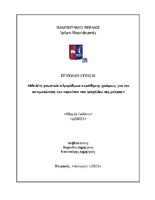Μελέτη γνωστών αλγορίθμων εκμάθησης γράφων, για την αντιμετώπιση του καρκίνου του τραχήλου της μήτρας

Bachelor Dissertation
Συγγραφέας
Γαλάνη, Μαρία
Ημερομηνία
2015-06Επιβλέπων
Βέργαδος, ΔημήτριοςΚουτσούρης, Δημήτριος
Προβολή/
Θεματική επικεφαλίδα
Καρκίνος ; ΑλγόριθμοιΛέξεις κλειδιά
Καρκίνος τραχήλου μήτρας ; HPV ; Pap test ; HPV DNA test ; mRNA test ; Flow test ; P16 test ; Δομημένο πιθανοτικό μοντέλο ; Μπεϋζιανά δίκτυα ; Συστήματα υποστήριξης κλινικής απόφασης ; Εξόρυξη γνώσης ; Αλγόριθμος K2 ; Γενετικοί αλγόριθμοι ; Αλγόριθμος Hill climbing ; Αλγόριθμος Simulated annealing ; Cervical cancer ; Built probabilistic model ; Bayesian networks ; Clinical decision support systems ; Mining ; Algorithm K2 ; Genetic algorithms ; Algorithm Hill climbing ; Simulated annealing algorithmΠερίληψη
Η παρούσα διπλωματική εργασία ασχολείται με τη σύγκριση γνωστών αλγορίθμων εκμάθησης γράφων που μελετήθηκαν, οι οποίοι ταξινομούν αποτελέσματα εξετάσεων απαραίτητων για τη διάγνωση του καρκίνου του τραχήλου της μήτρας, ώστε να προκύψουν τα καλύτερα δυνατά αποτελέσματα για την αντιμετώπιση του.
Ο συγκεκριμένος καρκίνος είναι πολύ συχνός, κυρίως σε γυναίκες που δεν εξετάζονται προληπτικά, και οι αιτίες εμφάνισης του δεν έχουν διευκρινιστεί με ακρίβεια και εγκυρότητα. Ο συσχετισμός του βέβαια με διάφορους τύπους του ιού HPV, αποτέλεσε σημαντικό βήμα για τη διερεύνηση και άλλων αιτιών που τον προκαλούν. Εξέταση ορόσημο για τον καρκίνο αυτό, αποτελεί ακόμα και σήμερα, το τεστ Παπανικολάου, το οποίο εφευρέθηκε το 1943, από γιατρό ελληνικής καταγωγής, το Γεώργιο Παπανικολάου. Λόγω του συγκεκριμένου τεστ, το ποστοστό θνησιμότητας των γυναικών που πάσχουν από καρκίνο του τραχήλου της μήτρας, μειώθηκε στο 74%.
Παρόλα αυτά, η διάγνωση της νόσου μέσω του τεστ Παπανικολάου δεν είναι πλήρως έγκυρη και επιτυχής, καθώς υπάρχει ένα ποσοστό λανθασμένης πρόβλεψης, και το αποτέλεσμα του τεστ για τα πλακώδη κύτταρα απροσδιορίστου σημασίας (ASCUS - atypical squamous cells of undetermined significance) χρήζει περαιτέρω διερεύνησης γιατί μπορεί να εγκυμονεί κινδύνους. Τα κύτταρα αυτά δεν έχουν «ξεκάθαρο χαρακτήρα» και αποτελούν κάτι σα «γκρι ζώνη». Στα πλαίσια της σωστής διάγνωσης λοιπόν, είναι απαραίτητο να περιληφθούν νέες τεχνικές ανίχνευσης των τραχηλικών αλλοιώσεων, όπως είναι το HPV DNA τεστ, το mRna τεστ, το flow τεστ και το P16 τεστ. Σε περίπτωση δηλαδή που το τεστ Παπανικολάου του ασθενή βγει θετικό, ο ασθενής πρέπει να υποβληθεί και σε άλλα τεστ προκειμένου να εξακριβωθεί το τι ακριβώς συμβαίνει. Όταν το τεστ Παπανικολάου βγει θετικό, σε καμία περίπτωση δε σημαίνει ότι ο ασθενής πάσχει 100% από καρκίνο του τραχήλου της μήτρας.
Στην παρούσα εργασία λάβαμε δεδομένα από 700 γυναίκες που είχαν πραγματοποιήσει και τις 5 παραπάνω εξετάσεις. Τα Μπεϋζιανά δίκτυα λειτουργούν σε αυτή την περίπτωση ως τμήμα των συστημάτων υποστήριξης κλινικής απόφασης, και προτιμώνται στην περίπτωση της διάγνωσης καθώς διαχειρίζονται σε καλύτερο βαθμό το στοιχείο της αβεβαιότητας. Πιο συγκεκριμένα, στην εργασία επικεντρωθήκαμε στην προσπάθεια διευκρίνησης των περιπτώσεων που εμφάνιζαν ASCUS ως αποτέλεσμα του τεστ Παπανικολάου προκειμένου να αποκτήσει ο ιατρός καλύτερη εικόνα για την υγεία της εξεταζόμενης. Το διαγνωστικό συμπέρασμα από τη σύγκριση των αποτελεσμάτων των αλγορίθμων θα μπορούσε να λειτουργήσει συμβουλευτικά για τον κλινικό ιατρό.


